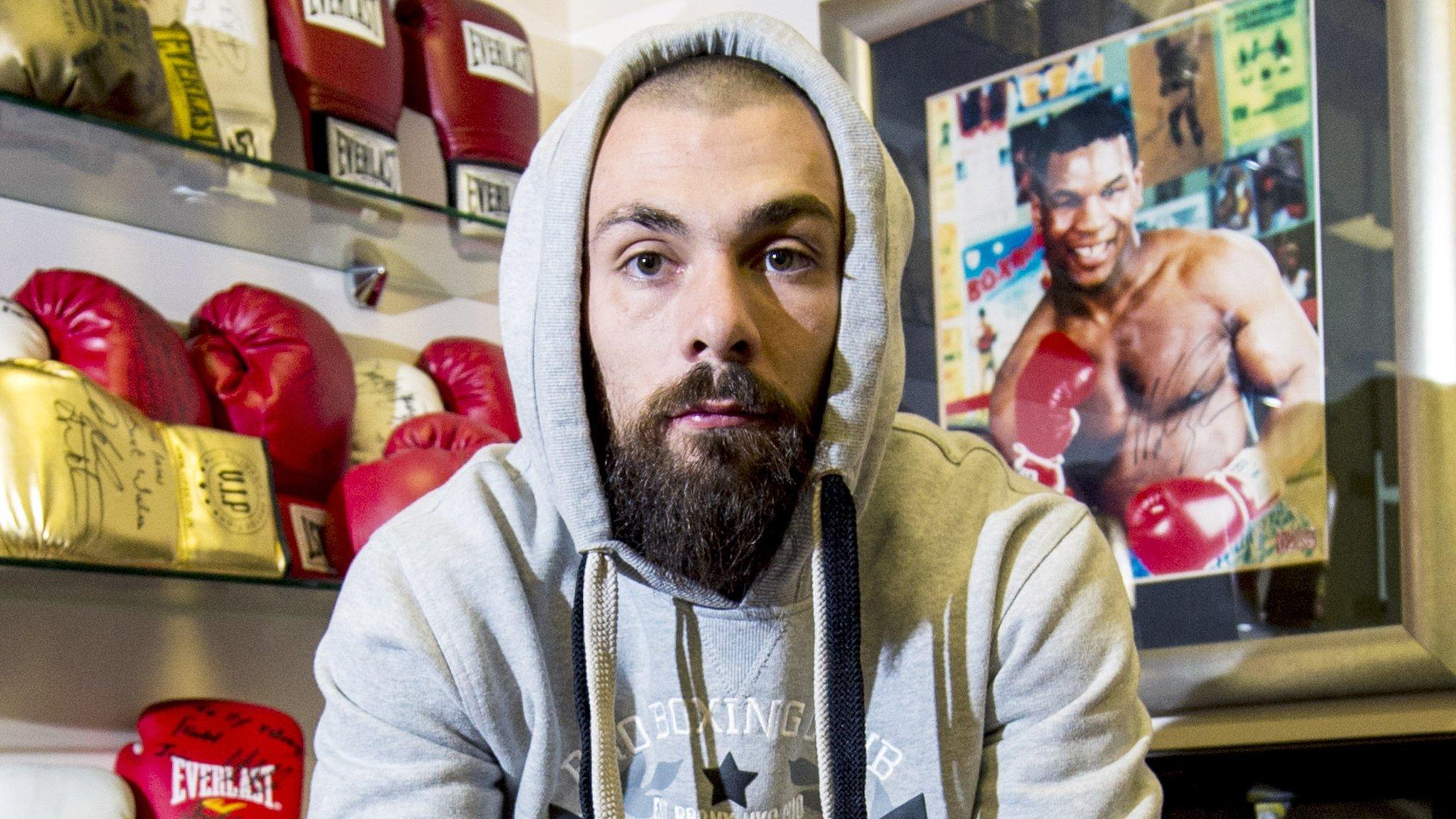Boxer's team 'not aware' of headaches
- Published
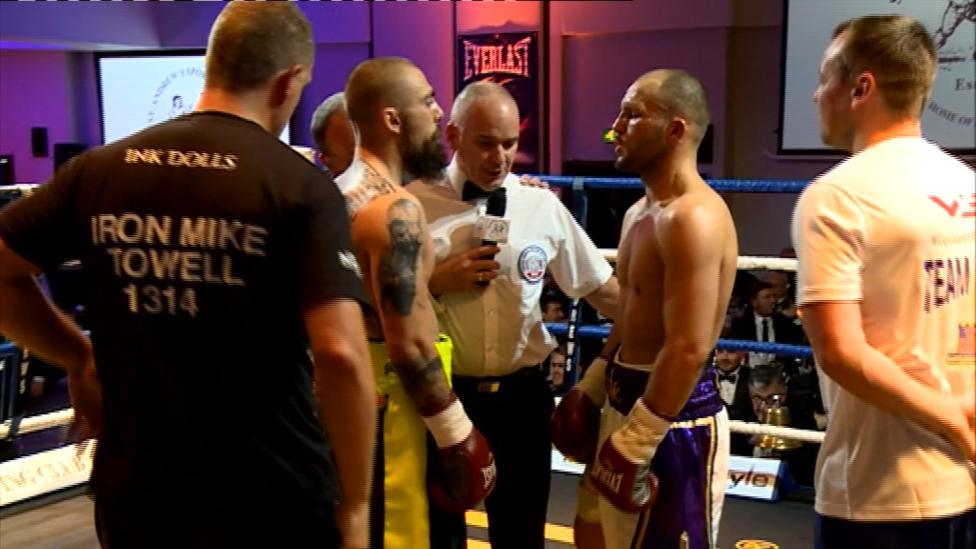
Mike Towell, centre left, was fighting Welsh boxer Dale Evans in a welterweight title eliminator
The management team behind Scottish boxer Mike Towell, who died after a fight, have said they were unaware he had been complaining of headaches.
Towell, 25, was knocked down twice during the bout in Glasgow on Thursday and died in hospital on Friday night.
His partner Chloe Ross revealed he had been suffering migraines for weeks but had dismissed it as pre-match stress.
Towell was taking part in a welterweight title eliminator against Welsh fighter Dale Evans
Many tributes have been paid to the young fighter from Dundee - known as "Iron Mike" - who is only the third professional boxer to die in the UK from apparently fight-related injuries in 21 years.
He passed away with his family at his bedside at Glasgow's Queen Elizabeth University Hospital.
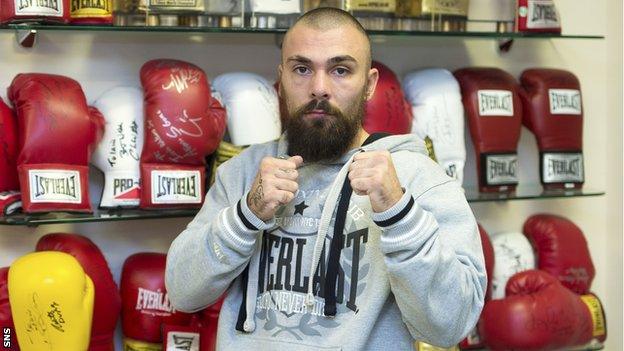
Mike Towell was knocked down in the first and fifth rounds of the fight
In a Facebook post, his partner Ms Ross said he had suffered brain damage but "fought right to the end", surviving for 12 hours after life support was turned off.
"I'm absolutely heartbroken to say my annoying best friend passed away tonight at 11.02 very peacefully," she wrote.
"Michael had severe bleeding and swelling to his brain.
"He had been complaining of headaches for the last few weeks but we put it down to migraines with the stress of his fight.
"It has been the longest 24 hours of our lives. My baby has lost his daddy. But he will be so so proud of his dad in what he achieved."
Ms Ross added: "Once he was taken off of his life support he managed 12 hours, 12 whole rounds off his life support, he fought right to the end and he's done us all so proud... He left doing the thing he's best at... there's only one."
The St Andrew's Sporting Club fight took place at Glasgow's Radisson Blu Hotel on Thursday evening.
Towell was knocked down in the first round of the fight before recovering to continue the match.
Referee Victor Loughlin stopped the fight in the fifth round shortly after Towell was knocked down by Carmarthen fighter Evans for a second time.
He received treatment in the ring and was given oxygen before being taken to an ambulance on a stretcher.
A spokesman for St Andrew's Sporting Club later said that Towell's management team was not aware of any headache problems leading up to the fight.
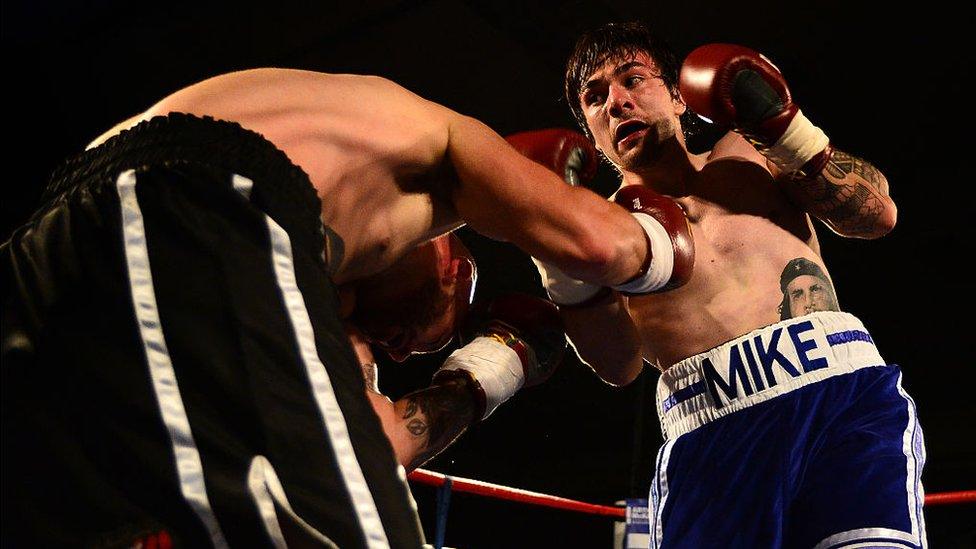
Mike Towell, pictured during a bout in May 2015, was previously undefeated
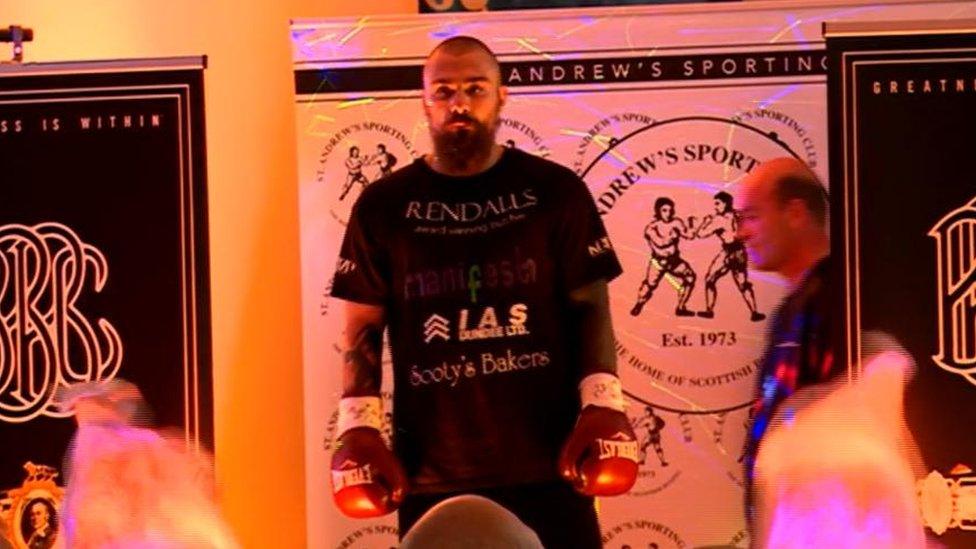
Mike Towell, just before the start of the St Andrew's Sporting Club bout
Spencer Oliver, the former European Super Bantamweight champion who was placed in a coma after being injured in a fight in 1998, said Towell would not have been allowed to fight if there had been doubts about his health.
He said: "He would have to have had all his medical tests. He was in a British title eliminator so all his brain scans would have been up to date and everything would have been in place with Mike going into that contest."
But boxing promoter Frank Warren raised concerns about the reports that Towell had been suffering from headaches.
He said: "If that's true, obviously he shouldn't have been fighting. And I'm quite sure, the doctor, who examines the boxers and the medicals, if they had of known that, they would not have allowed him to box.
"So, obviously once the British Boxing Board of Control complete their investigation into the matter, they'll be able to give further comment on that."

Boxing tragedies
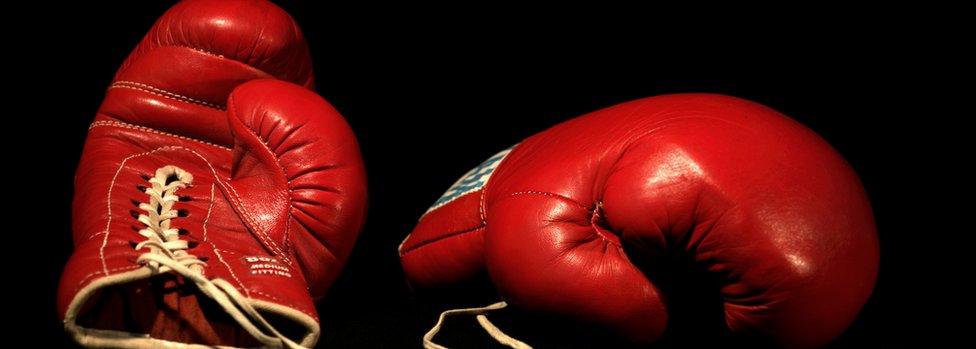
Featherweight Lynn James is recorded as the first British boxer to have died following a fight, in 1964, aged 21.
Johnny Owen, 24, died in hospital in November 1980, more than a month after his bantamweight fight with Mexican Lupe Pintor left him unconscious. It was found that the Welsh-born boxer had an unusually delicate skull.
Super welterweight fighter Steve Watt, 27, from Glasgow died in March 1986 following a fight with Rocky Kelly. It was found he had sustained brain damage over a long period of time.
Michael Watson, 51, needed six brain operations after he was punched during a rematch against Chris Eubank in September 1991. The middleweight fighter spent 40 days in a coma and several years in a wheelchair, ending his boxing career.
Bradley Stone, 23, collapsed hours after a fight against Richie Wenton in London, in April 1994. The super bantamweight fighter developed a huge blood clot on his brain
James Murray, 25, from Lanarkshire, suffered a brain bleed and seizure. He died two days after his bantamweight fight against Drew Docherty in October 1995.
Light middleweight Michael Norgrove, 32, died in April 2013, several days after suffering a haemorrhage at a fight against Tom Bowen at Blackfriars, London.

Towell's family were joined by his manager, Tommy Gilmour, during his final hours.
Mr Gilmour said: "He was Iron Mike to the end, he kept fighting till the last, and we have lost an exciting boxer but, more importantly, a very special man.
"I am devastated and all my thoughts are with Mike's mum Tracey, his partner Chloe and their little son Rocco."
Many well known figures in boxing paid tribute to Towell.
Professional boxer turned promoter Ricky Hatton set up a JustGiving page, external to raise £20,000 to support Towell's family.
Trainer Shane McGuigan said on Twitter, external: "Heartbreaking news that Mike Towell has lost his life. May he rest in peace, thoughts go out to his loved ones. #RIP"
Promoter Eddie Hearn tweeted, external: "Absolutely devastated by the passing of Mike Towell - all of our thoughts with his friends and family at this time."
The boxer had been undefeated going into Thursday's fight, with 11 previous wins and one draw on his professional record.
Veteran Labour MP Paul Flynn described Mike Towell's death as "a terrible tragedy" and renewed his call for blows to the head to be banned in sport.
The shadow cabinet member twice called for the rule change through private member's bills in 1998 and and 2005 but failed on both occasions.
Mr Flynn said: "I think the consciences of people in the sport are aroused by tragedies of this kind and I think people should be aware of the dangers.
"We ought to change the rules in many sports and realise that the head is a very delicate part of the body and to protect it, and minimise the number of blows the brain suffers."
- Published1 October 2016
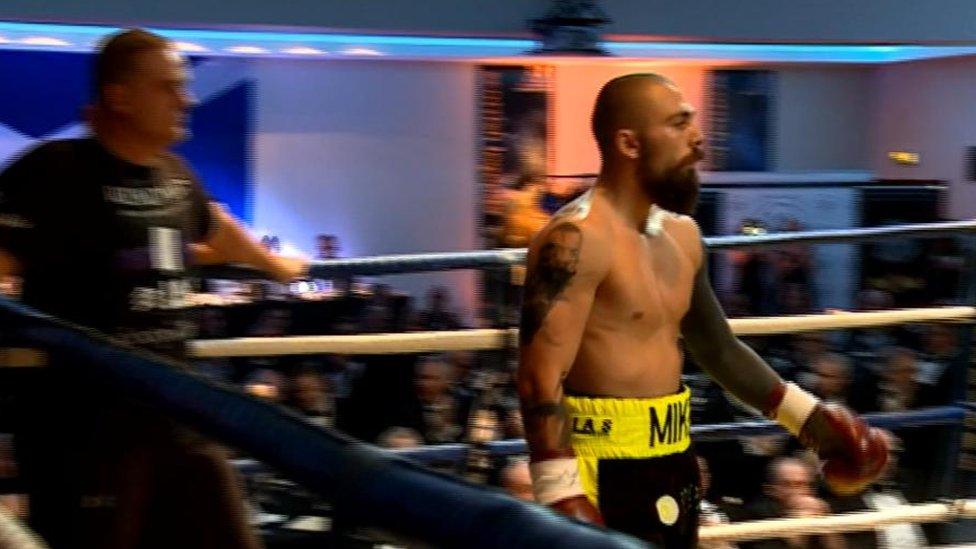
- Published1 October 2016

- Attribution
- Published30 September 2016
